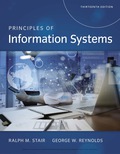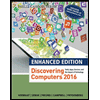
Principles of Information Systems (MindTap Course List)
13th Edition
ISBN: 9781337516945
Author: STAIR
Publisher: Cengage
expand_more
expand_more
format_list_bulleted
Question
Chapter 2, Problem 5DQ
Program Plan Intro
Organizational Culture:
- Organizational culture is defined as the values and behaviors that contribute to an organization’s environment.
- It usually affects the productivity and performance of an organization, as well as provides guidelines on customer care and services, attendance and punctuality, product quality and safety, and also environment concern.
- It remains unique for every organization and it very hard to change the things.
- It is also extended to production methods, marketing and advertising practices, and to new product creation.
Program Plan Intro
Organizational Culture:
- Organizational culture is defined as the values and behaviors that contribute to an organization’s environment.
- It usually affects the productivity and performance of an organization, as well as provides guidelines on customer care and services, attendance and punctuality, product quality and safety, and also environment concern.
- It remains unique for every organization and it very hard to change the things.
- It is also extended to production methods, marketing and advertising practices, and to new product creation.
Expert Solution & Answer
Want to see the full answer?
Check out a sample textbook solution
Students have asked these similar questions
using r language
using r language
Compute a Monte Carlo estimate of
0.8
by sampling from Uniform(0,0.8) and estimate the variance of ⑦.
Chapter 2 Solutions
Principles of Information Systems (MindTap Course List)
Ch. 2.1 - Prob. 1RQCh. 2.1 - Prob. 2RQCh. 2.1 - Prob. 1CTQCh. 2.1 - Prob. 2CTQCh. 2.2 - Prob. 1RQCh. 2.2 - Prob. 2RQCh. 2.2 - What questions about this assignment would you...Ch. 2.2 - What actions would you recommend to minimize...Ch. 2.3 - Prob. 1RQCh. 2.3 - Prob. 2RQ
Ch. 2.3 - You have been asked by the human resources...Ch. 2.3 - Prob. 2CTQCh. 2.4 - Prob. 1RQCh. 2.4 - Prob. 2RQCh. 2.4 - Prob. 1CTQCh. 2.4 - Prob. 2CTQCh. 2 - Prob. 1SATCh. 2 - Prob. 2SATCh. 2 - Prob. 3SATCh. 2 - Which of the following is not a true statement...Ch. 2 - Prob. 5SATCh. 2 - Prob. 6SATCh. 2 - of large information system projects fail, at...Ch. 2 - The three stages of Lewins change model include...Ch. 2 - The ____________ change model is helpful in...Ch. 2 - The Bureau of Labor Statistics forecasts an...Ch. 2 - Prob. 11SATCh. 2 - _______________ is a process for testing skills...Ch. 2 - Prob. 1RQCh. 2 - Prob. 2RQCh. 2 - Prob. 3RQCh. 2 - Prob. 4RQCh. 2 - Prob. 5RQCh. 2 - Prob. 6RQCh. 2 - Prob. 7RQCh. 2 - Prob. 8RQCh. 2 - Prob. 9RQCh. 2 - Prob. 10RQCh. 2 - Prob. 11RQCh. 2 - Prob. 12RQCh. 2 - Prob. 13RQCh. 2 - Prob. 1DQCh. 2 - Prob. 2DQCh. 2 - Prob. 3DQCh. 2 - Prob. 4DQCh. 2 - Prob. 5DQCh. 2 - Your manager has asked for your input on ideas for...Ch. 2 - Prob. 7DQCh. 2 - Prob. 8DQCh. 2 - Prob. 9DQCh. 2 - Prob. 10DQCh. 2 - Use graphics software to develop a force field...Ch. 2 - Do research to learn more about GEs Change...Ch. 2 - Prob. 1TACh. 2 - Prob. 2TACh. 2 - Prob. 3TACh. 2 - Prob. 1WECh. 2 - Prob. 2WECh. 2 - Prob. 3WECh. 2 - Prob. 1CECh. 2 - Prob. 2CECh. 2 - Prob. 3CECh. 2 - Prob. 1CTQ1Ch. 2 - Prob. 2CTQ1Ch. 2 - Prob. 3CTQ1Ch. 2 - Prob. 1CTQ2Ch. 2 - Prob. 2CTQ2Ch. 2 - Prob. 3CTQ2
Knowledge Booster
Similar questions
- Write a C program using embedded assembler with a function to convert a digit (0 – 15) to the corresponding ASCII character representing the value in hexadecimal. For numbers 0 – 9, the output will be the characters '0' – '9', for numbers 10 – 15 the characters 'A' – 'F'. The entire core of the program must be written in symbolic instruction language; arrays may not be used. You may only use C to print the result. Tip: This piece of C program will do the same thing: character = number < 10 ? number + '0' : number + 55; As a basis, you can use this program again , which increments a variable. Just replace the INC instruction with ADD and add a test (CMP) with some conditional jump.arrow_forwardAnswer the question fully and accurately by providing the required files(Java Code, Two output files and written answers to questions 1-3 in a word document)meaning question 1 to 3 also provide correct answers for those questions.(note: this quetion is not graded).arrow_forward.NET Interactive Solving Sudoku using Grover's Algorithm We will now solve a simple problem using Grover's algorithm, for which we do not necessarily know the solution beforehand. Our problem is a 2x2 binary sudoku, which in our case has two simple rules: •No column may contain the same value twice •No row may contain the same value twice If we assign each square in our sudoku to a variable like so: 1 V V₁ V3 V2 we want our circuit to output a solution to this sudoku. Note that, while this approach of using Grover's algorithm to solve this problem is not practical (you can probably find the solution in your head!), the purpose of this example is to demonstrate the conversion of classical decision problems into oracles for Grover's algorithm. Turning the Problem into a Circuit We want to create an oracle that will help us solve this problem, and we will start by creating a circuit that identifies a correct solution, we simply need to create a classical function on a quantum circuit that…arrow_forward
- .NET Interactive Solving Sudoku using Grover's Algorithm We will now solve a simple problem using Grover's algorithm, for which we do not necessarily know the solution beforehand. Our problem is a 2x2 binary sudoku, which in our case has two simple rules: •No column may contain the same value twice •No row may contain the same value twice If we assign each square in our sudoku to a variable like so: 1 V V₁ V3 V2 we want our circuit to output a solution to this sudoku. Note that, while this approach of using Grover's algorithm to solve this problem is not practical (you can probably find the solution in your head!), the purpose of this example is to demonstrate the conversion of classical decision problems into oracles for Grover's algorithm. Turning the Problem into a Circuit We want to create an oracle that will help us solve this problem, and we will start by creating a circuit that identifies a correct solution, we simply need to create a classical function on a quantum circuit that…arrow_forwardAnswer two JAVA OOP problems.arrow_forwardAnswer two JAVA OOP problems.arrow_forward
arrow_back_ios
SEE MORE QUESTIONS
arrow_forward_ios
Recommended textbooks for you
 Principles of Information Systems (MindTap Course...Computer ScienceISBN:9781305971776Author:Ralph Stair, George ReynoldsPublisher:Cengage Learning
Principles of Information Systems (MindTap Course...Computer ScienceISBN:9781305971776Author:Ralph Stair, George ReynoldsPublisher:Cengage Learning Fundamentals of Information SystemsComputer ScienceISBN:9781337097536Author:Ralph Stair, George ReynoldsPublisher:Cengage Learning
Fundamentals of Information SystemsComputer ScienceISBN:9781337097536Author:Ralph Stair, George ReynoldsPublisher:Cengage Learning Information Technology Project ManagementComputer ScienceISBN:9781337101356Author:Kathy SchwalbePublisher:Cengage Learning
Information Technology Project ManagementComputer ScienceISBN:9781337101356Author:Kathy SchwalbePublisher:Cengage Learning Enhanced Discovering Computers 2017 (Shelly Cashm...Computer ScienceISBN:9781305657458Author:Misty E. Vermaat, Susan L. Sebok, Steven M. Freund, Mark Frydenberg, Jennifer T. CampbellPublisher:Cengage Learning
Enhanced Discovering Computers 2017 (Shelly Cashm...Computer ScienceISBN:9781305657458Author:Misty E. Vermaat, Susan L. Sebok, Steven M. Freund, Mark Frydenberg, Jennifer T. CampbellPublisher:Cengage Learning Principles of Information Systems (MindTap Course...Computer ScienceISBN:9781285867168Author:Ralph Stair, George ReynoldsPublisher:Cengage Learning
Principles of Information Systems (MindTap Course...Computer ScienceISBN:9781285867168Author:Ralph Stair, George ReynoldsPublisher:Cengage Learning Fundamentals of Information SystemsComputer ScienceISBN:9781305082168Author:Ralph Stair, George ReynoldsPublisher:Cengage Learning
Fundamentals of Information SystemsComputer ScienceISBN:9781305082168Author:Ralph Stair, George ReynoldsPublisher:Cengage Learning

Principles of Information Systems (MindTap Course...
Computer Science
ISBN:9781305971776
Author:Ralph Stair, George Reynolds
Publisher:Cengage Learning

Fundamentals of Information Systems
Computer Science
ISBN:9781337097536
Author:Ralph Stair, George Reynolds
Publisher:Cengage Learning

Information Technology Project Management
Computer Science
ISBN:9781337101356
Author:Kathy Schwalbe
Publisher:Cengage Learning

Enhanced Discovering Computers 2017 (Shelly Cashm...
Computer Science
ISBN:9781305657458
Author:Misty E. Vermaat, Susan L. Sebok, Steven M. Freund, Mark Frydenberg, Jennifer T. Campbell
Publisher:Cengage Learning

Principles of Information Systems (MindTap Course...
Computer Science
ISBN:9781285867168
Author:Ralph Stair, George Reynolds
Publisher:Cengage Learning

Fundamentals of Information Systems
Computer Science
ISBN:9781305082168
Author:Ralph Stair, George Reynolds
Publisher:Cengage Learning